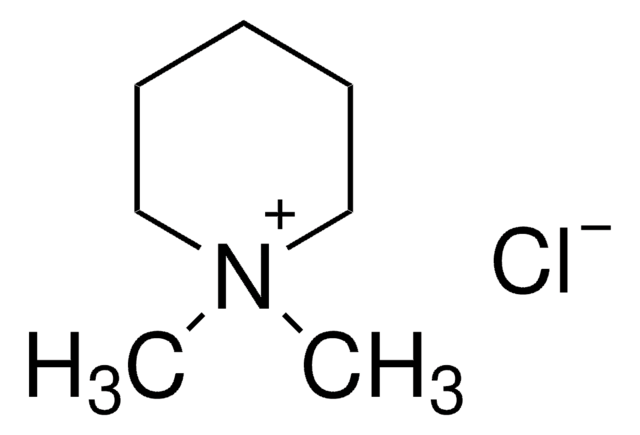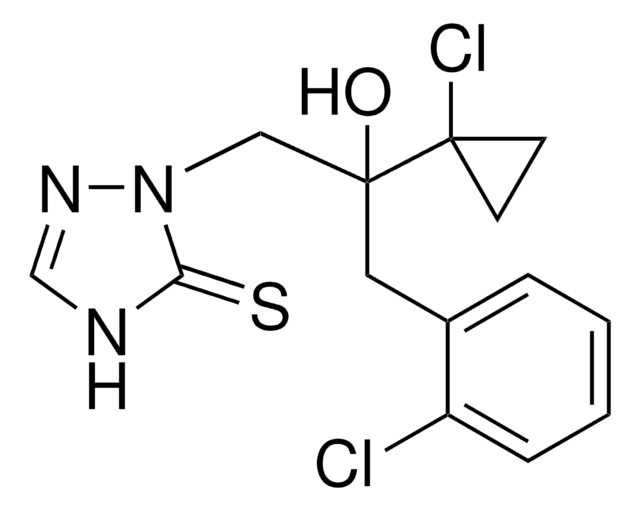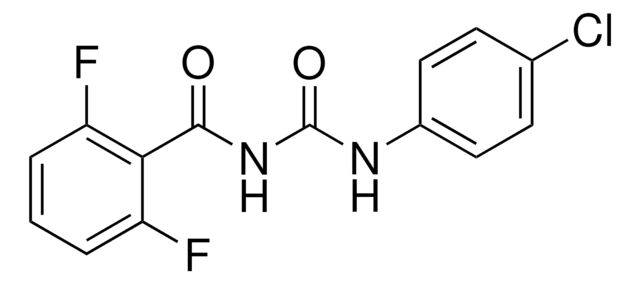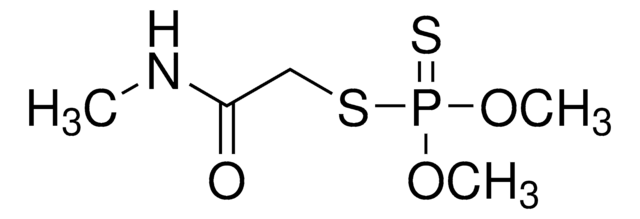38117
Mepiquat chloride
certified reference material, TraceCERT®, Manufactured by: Sigma-Aldrich Production GmbH, Switzerland
Synonyme(s) :
1,1-Dimethylpiperidinium chloride
About This Item
Produits recommandés
Qualité
certified reference material
TraceCERT®
Niveau de qualité
Gamme de produits
TraceCERT®
Durée de conservation
limited shelf life, expiry date on the label
Fabricant/nom de marque
Manufactured by: Sigma-Aldrich Production GmbH, Switzerland
Température de stockage
2-8°C
Chaîne SMILES
[Cl-].C[N+]1(C)CCCCC1
InChI
1S/C7H16N.ClH/c1-8(2)6-4-3-5-7-8;/h3-7H2,1-2H3;1H/q+1;/p-1
Clé InChI
VHOVSQVSAAQANU-UHFFFAOYSA-M
Vous recherchez des produits similaires ? Visite Guide de comparaison des produits
Catégories apparentées
Description générale
Mepiquat chloride is a synthetic plant growth regulator that is absorbed by the foliage and translocated throughout the plant. It is widely used to manipulate plant structure and helps to combat excessive vegetative growth, which if left uncontrolled can lead to undesirable fruit shed, boll rot, and yield reductions. Mepiquat chloride inhibits gibberellic acid synthesis, thus reducing cell enlargement and cell division rate. Application of mepiquat chloride in cotton results in a more compact plant caused by shortened internode elongation, reduced main stem nodes and decreased leaf expansion and leaf area.
Mepiquat chloride is approved for use in European Union (EU) following Regulation (EC) No 1107/2009 (repealing Directive 91/414/EEC). The maximum residue level (MRL) for Mepiquat (sum of mepiquat and its salts, expressed as mepiquat chloride) is established from 0.02 mg/kg to 4 mg/kg for many plant-based products and 40 mg/kg for linseed, mustard, sunflower, and poppy seeds. For products of animal origin, the MRL is set from 0.05 mg/kg to 0.8 mg/kg as per Reg. (EU) 2021/976.
Mepiquat has to be monitored in the Multiannual Control Programme for Pesticides Residues (MACP), run within the EU and EFTA in/on products of plant origin.
Application
- Evaluate the influence of plant density on cotton response to mepiquat chloride application in order to isolate a specific combination for optimizing plant stature and yield
- Quantify the growth and physiological responses of cotton plants to temperature regimes and mepiquat chloride rates
- Quantify the efficacy of mepiquat chloride on plant height, culm morphological characteristics, lignin accumulation, related enzyme activities, and its relationship with lodging resistance in maize
- Evaluate the roles of gibberellic acid metabolism and signaling in mepiquat chloride-induced inhibition of internode elongation in cotton seedlings
- Evaluate the effects of different mepiquat chloride concentrations on morphological and physiological changes in Eucalyptus clones
Produits recommandés
Informations légales
Vous ne trouvez pas le bon produit ?
Essayez notre Outil de sélection de produits.
Mention d'avertissement
Warning
Mentions de danger
Conseils de prudence
Classification des risques
Acute Tox. 4 Oral - Aquatic Chronic 3
Code de la classe de stockage
11 - Combustible Solids
Classe de danger pour l'eau (WGK)
WGK 2
Point d'éclair (°F)
Not applicable
Point d'éclair (°C)
Not applicable
Faites votre choix parmi les versions les plus récentes :
Certificats d'analyse (COA)
Vous ne trouvez pas la bonne version ?
Si vous avez besoin d'une version particulière, vous pouvez rechercher un certificat spécifique par le numéro de lot.
Déjà en possession de ce produit ?
Retrouvez la documentation relative aux produits que vous avez récemment achetés dans la Bibliothèque de documents.
Notre équipe de scientifiques dispose d'une expérience dans tous les secteurs de la recherche, notamment en sciences de la vie, science des matériaux, synthèse chimique, chromatographie, analyse et dans de nombreux autres domaines..
Contacter notre Service technique







